Filter by

Safe to be open : study on the protection of research data and recommendation…
This study addresses the most important legal issues when implementing an open access e-infrastructure for research data. It examines the legal requirements for different kinds of usage of research data in an open access infrastructure, such as OpenAIREplus, which links them to publications. The existing legal framework regarding potentially relevant intellectual property (IP) rights is analyse…
- Edition
- -
- ISBN/ISSN
- 9783863951474
- Collation
- 165p. : ill.
- Series Title
- -
- Call Number
- 025.52 SAF s

Implementing open access mandates in Europe - OpenAIRE study on the developme…
The implementation of open access policies in Europe is a socio-technical undertaking whereby a wide range of stakeholders work together to bring out the benefits of open access for European and global research. This work provides a unique overview of national awareness of open access in 32 European countries involving all EU member states and in addition, Norway, Iceland, Croatia, Switzerland …
- Edition
- -
- ISBN/ISSN
- 9783863950958
- Collation
- 175p. : ill.
- Series Title
- -
- Call Number
- 070.57973094 SCH i

Critical perspectives on cultural memory and heritage
Critical Perspectives on Cultural Memory and Heritage focuses on the importance of memory and heritage for individual and group identity, and for their sense of belonging. It aims to expose the motives and discourses related to the destruction of memory and heritage during times of war, terror, sectarian conflict and through capitalist policies. It is within these affected spheres of cultural h…
- Edition
- -
- ISBN/ISSN
- 9781787354845
- Collation
- XVIII, 315 p.
- Series Title
- -
- Call Number
- 949.601 APA c
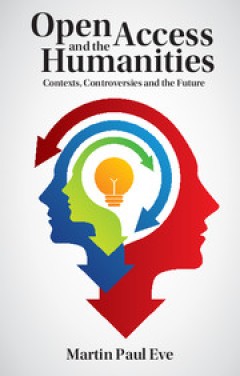
Open access and the humanities : contexts, controversies and the future
If you work in a university, you are almost certain to have heard the term 'open access' in the past couple of years. You may also have heard either that it is the utopian answer to all the problems of research dissemination or perhaps that it marks the beginning of an apocalyptic new era of 'pay-to-say' publishing. In this book, Martin Paul Eve sets out the histories, contexts and controversie…
- Edition
- -
- ISBN/ISSN
- 9781107484016
- Collation
- xv, 209p. : ill.
- Series Title
- -
- Call Number
- 001.30285 EVE o
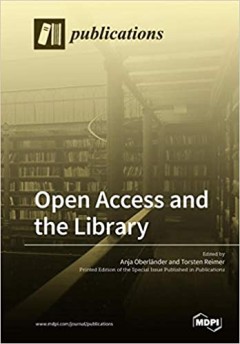
Open access and the library
Libraries are places of learning and knowledge creation. Over the last two decades, digital technology—and the changes that came with it—have accelerated this transformation to a point where evolution starts to become a revolution.The wider Open Science movement, and Open Access in particular, is one of these changes and is already having a profound impact. Under the subscription model, the…
- Edition
- -
- ISBN/ISSN
- 9783038977407
- Collation
- vii, 131p. : ill.
- Series Title
- -
- Call Number
- 026.3 OPE o

The deliverance of open access books : examining usage and dissemination
In many scholarly disciplines, books - not articles - are the norm. As print runs become smaller, the question arises whether publishing monographs in open access helps to make their contents globally accessible. To answer this question, the results of multiple studies on the usage of open access books are presented. The research focuses on three areas: economic viability; optimization of open …
- Edition
- -
- ISBN/ISSN
- 9789085551201
- Collation
- 234p. : ill.
- Series Title
- -
- Call Number
- 002.09 SNI d
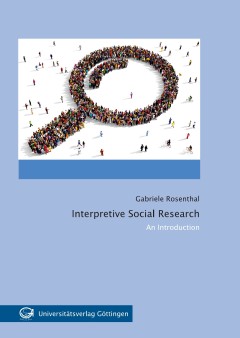
Interpretive social research : an introduction
This volume is a clear introduction to methods of data collection and analysis in the social sciences, with a special focus on interpretive methods based on a logic of discovering hypotheses and grounded theories. The chief methods presented are participant observation, open interviews and biographical case reconstruction. The special advantages of interpretive methods, as against other qualita…
- Edition
- -
- ISBN/ISSN
- 9783863953744
- Collation
- 246p. : ill.
- Series Title
- -
- Call Number
- 301 ROS i
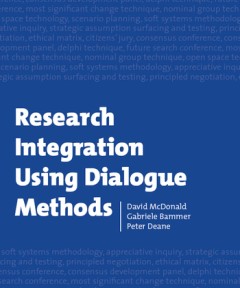
Research integration using dialogue methods
Research on real-world problems—like restoration of wetlands, the needs of the elderly, effective disaster response and the future of the airline industry—requires expert knowledge from a range of disciplines, as well as from stakeholders affected by the problem and those in a position to do something about it. This book charts new territory in taking a systematic approach to research integ…
- Edition
- -
- ISBN/ISSN
- 9781921536755
- Collation
- ix, 165p. : ill.
- Series Title
- -
- Call Number
- 001.4 MCD r
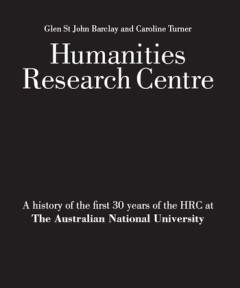
Humanities Research Centre : a history of the first 30 years of the HRC at th…
Humanities; Research; History
- Edition
- -
- ISBN/ISSN
- 9789751229830
- Collation
- xiii, 400p. : ill.
- Series Title
- -
- Call Number
- 001.307119471 BAR h

Equitable research partnerships : a global code of conduct to counter ethics …
This open access book offers insights into the development of the ground-breaking Global Code of Conduct for Research in Resource-Poor Settings (GCC) and the San Code of Research Ethics. Using a new, intuitive moral framework predicated on fairness, respect, care and honesty, both codes target ethics dumping – the export of unethical research practices from a high-income setting to a lower- o…
- Edition
- -
- ISBN/ISSN
- 9783030157456
- Collation
- xix, 122p : ill,
- Series Title
- -
- Call Number
- 174.9 SCH e
 Computer Science, Information & General Works
Computer Science, Information & General Works  Philosophy & Psychology
Philosophy & Psychology  Religion
Religion  Social Sciences
Social Sciences  Language
Language  Pure Science
Pure Science  Applied Sciences
Applied Sciences  Art & Recreation
Art & Recreation  Literature
Literature  History & Geography
History & Geography